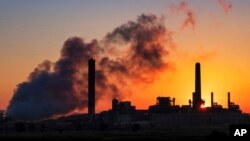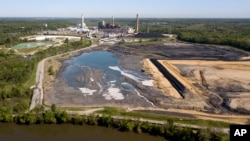U.S. President Donald Trump's administration weakened environmental controls on coal production Tuesday, overturning national regulations set by his predecessor, former President Barack Obama.
The Environmental Protection Agency said it will now allow individual coal-producing states to set their own rules for carbon emissions rather than have to adhere to an overall countrywide standard. The plan is subject to a 60-day comment period before it is finalized.
The action marks a fulfillment of a 2016 Trump campaign pledge to boost the fortunes of coal companies and coal-producing states.
It came hours before the president headed to a political rally for a Senate candidate in West Virginia, the second-biggest U.S. coal production state, where he was expected to promote the plan. During his successful run for the White House, Trump supporters in coal states often held signs saying, "Trump Digs Coal."
The EPA decision is Trump's latest effort to topple Obama's environmental legacy, following his withdrawal of the U.S. from the 2015 international Paris climate control accord championed by the former president.
At the time that he revoked U.S. participation in the agreement, Trump said, "I was elected by the citizens of Pittsburgh, not Paris."
The EPA said its new rule is designed to replace Obama's 2015 Clean Power Plan that targeted greenhouse gas emissions from coal plants and sought to shift power production away from coal to abundant natural gas supplies in the U.S., along with wind and solar energy. Trump's EPA called the Obama rules "overly prescriptive and burdensome."
Echoing that, Jason Bostic, vice president of the West Virginia Coal Association, told VOA, "The first thing (Trump's action) does is that it relieves an enormous amount of uncertainty over the utilities that burn coal to generate electricity in the country.
Bostic said the utilities have "invested billions of dollars over the last 15 years, in particular, to comply with other emission controls standards. And those utilities, those plant owners didn't know whether or not they could keep those plants running had the Clean Power Plan had been allowed to go into effect. So it removes the uncertainty from the utilities, they can continue to operate the plants."
The White House said the policy change will "significantly decrease bureaucratic red tape and compliance costs" for coal companies, "keeping American energy affordable and competitive on the world stage."
But environmental groups immediately attacked the Trump administration edict, with the Natural Resources Defense Council calling it a "Dirty Power Plan."
Illinois Attorney General Lisa Madigan vowed to "take legal action to ensure the federal government does its job" to protect the environment. She is a part of a 17-state coalition and a handful of municipalities that support Obama's regulations.
Environmental advocates said the Trump policy change, assuming some states weaken their regulations compared to the current national standards, will boost emissions from coal-fired power plants and worsen global warming.
House Democratic leader Nancy Pelosi said, “The Trump administration’s disdain for the clean air our children breathe and the clean water they drink knows no bounds. This rule is a brazen special interest handout that poisons families’ health today, and threatens their security and well-being for decades to come by accelerating the climate crisis."
White House correspondent Patsy Widakuswara in Charleston, West Virginia contributed to this story.





